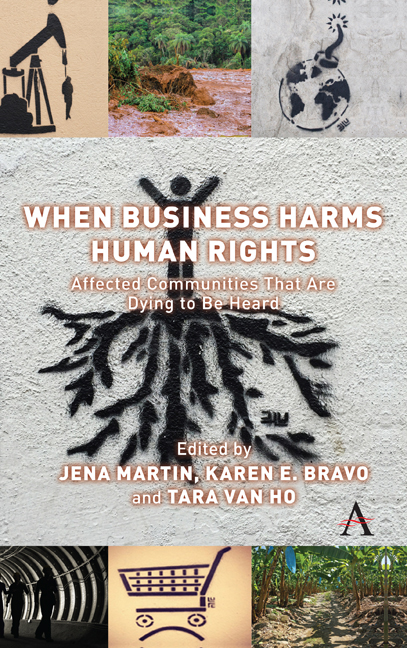Book contents
- Frontmatter
- Contents
- Preface
- Acknowledgements
- Introduction
- Chapter 1 Complicity in False Arrest, Imprisonment and Theft by a Fairtrade-Certified Company
- Chapter 2 Hindrances to Access to a Remedy in Business-Related Cases in Colombia: The Case of Gilberto Torres
- Chapter 3 The Global Pursuit for Justice for DBCP-Exposed Banana Farmers
- Chapter 4 The Rupturing of the Dam and the Community’s Social Fabric: A Testimony from an ‘Atingido’ from Bento Rodrigues, Brazil
- Chapter 5 Taming the Dragon, Unpacking Options for Access to Remedy for Violations by Chinese Multinational Corporations Operating in Chiadzwa, Zimbabwe
- Chapter 6 Máxima Acuña: The Story of How a Business Impacted Human Rights Defenders
- Chapter 7 Community Interrupted, ‘Life Projects’ Disrupted: Cajamarca, Ibagué, and the La Colosa Mine in Colombia
- Chapter 8 Occupational Health as a Human Right: A Case Study in a Turkish Free Trade Zone
- Chapter 9 The Price of the ‘Black Dollar’: Veteran Coal Miners and the Right to Health
- Chapter 10 Abandoned: A Tale of Two Mine Closures in South Africa
- Conclusion
- Appendices
- List of Contributors
- Index
Chapter 6 - Máxima Acuña: The Story of How a Business Impacted Human Rights Defenders
Published online by Cambridge University Press: 20 January 2022
- Frontmatter
- Contents
- Preface
- Acknowledgements
- Introduction
- Chapter 1 Complicity in False Arrest, Imprisonment and Theft by a Fairtrade-Certified Company
- Chapter 2 Hindrances to Access to a Remedy in Business-Related Cases in Colombia: The Case of Gilberto Torres
- Chapter 3 The Global Pursuit for Justice for DBCP-Exposed Banana Farmers
- Chapter 4 The Rupturing of the Dam and the Community’s Social Fabric: A Testimony from an ‘Atingido’ from Bento Rodrigues, Brazil
- Chapter 5 Taming the Dragon, Unpacking Options for Access to Remedy for Violations by Chinese Multinational Corporations Operating in Chiadzwa, Zimbabwe
- Chapter 6 Máxima Acuña: The Story of How a Business Impacted Human Rights Defenders
- Chapter 7 Community Interrupted, ‘Life Projects’ Disrupted: Cajamarca, Ibagué, and the La Colosa Mine in Colombia
- Chapter 8 Occupational Health as a Human Right: A Case Study in a Turkish Free Trade Zone
- Chapter 9 The Price of the ‘Black Dollar’: Veteran Coal Miners and the Right to Health
- Chapter 10 Abandoned: A Tale of Two Mine Closures in South Africa
- Conclusion
- Appendices
- List of Contributors
- Index
Summary
Máxima Acuña is a Peruvian campesina (‘female peasant farmer’). She is also a human rights defender. Specifically, she is part of a social movement defending and promoting human rights in the context of the Conga mining project to be developed in the Cajamarca region of northern Peru. The Conga mining project first belonged to Minas Conga Ltd, but was purchased in 2001 by Minera Yanacocha Ltd (‘Yanacocha’). Yanacocha is a joint venture gold company founded in 1992 in Peru. It operates another mine in the region, also called Yanacocha, which is known to be the largest gold mine in South America. Yanacocha is majority owned by Newmont Mining Corporation (‘Newmont’), a US-based company founded in 1921. Since 2011, Máxima Acuña, her husband Jaime Chaupe and their children have been involved in a legal dispute with Yanacocha regarding a parcel of land in an area known as Tragadero Grande, where she lives. Amnesty International has been in close contact with and has campaigned for Máxima Acuña since 2013.
This chapter aims to show, through Máxima's story, areas in which natural resource extraction projects may generate human rights risks, especially with respect to human rights defenders. The chapter makes recommendations to both governments and businesses on the basis of its findings. It does not pretend to determine who has the right to property or the possession of the land in dispute in the case under review, as this is a matter for Peru's judicial system. As of March 2018, the time of the writing of this chapter, the decision around the property of the portion of land was still pending.
In October 2016 and March 2017, Amnesty International carried out several missions to Lima and Cajamarca in order to conduct interviews with civil society, government officials and Yanacocha representatives, as part of the organization's work in monitoring the situation of human rights defenders across the region. In writing this chapter, Amnesty International also took into account the conclusions published in September 2016 by an independent fact-finding mission commissioned by Newmont and conducted under the auspices of the organization RESOLVE.
- Type
- Chapter
- Information
- When Business Harms Human RightsAffected Communities that Are Dying to Be Heard, pp. 87 - 108Publisher: Anthem PressPrint publication year: 2020



